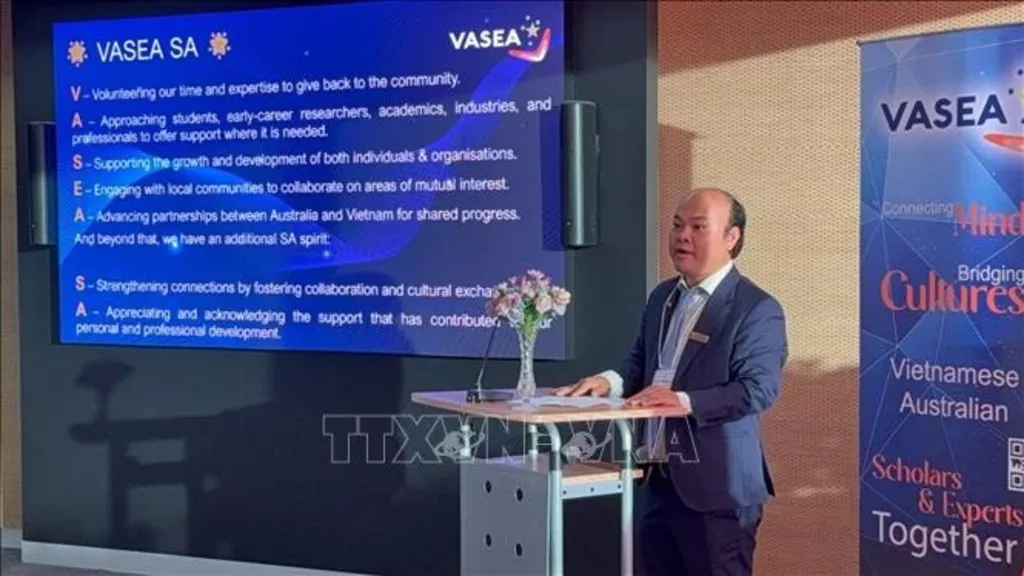 |
| Dr. Nam Nghiep Tran, a senior lecturer at the University of Adelaide’s School of Chemical Engineering__Photo: VNA |
With strong determination, a spirit of innovation, and the unity of Vietnamese people both at home and abroad, coupled with strategic partnerships such as with Australia, Vietnam is poised not only to rise but also to serve as a model for sustainable development in today’s challenging world.
Speaking to a Vietnam News Agency (VNA) correspondent in Australia, Dr. Nam Nghiep Tran, a senior lecturer at the University of Adelaide’s School of Chemical Engineering, shared his optimism about Vietnam’s remarkable transformation in economic, social, and geopolitical terms.
According to Nghiep, Vietnam has transitioned from a centrally planned economy to a socialist-oriented market economy, a challenging journey that has been marked by resilience and determination. Administrative reform policies, investment in education, infrastructure, and digital transformation, and proactive global integration have helped Vietnam emerge from poverty to become a middle-income country and a trusted destination for international investors.
Nghiep, who also serves as President of the South Australia chapter of the Vietnam-Australia Scholars and Experts Association (VASEA), emphasized that national unity has always been a core value of the Vietnamese people and remains essential to the country’s continued development. In a world fractured by geopolitical conflicts and economic crises, he stressed that solidarity is not only a source of internal strength but a strategic necessity.
He called on Vietnamese people worldwide to stand together, not only to safeguard national interests but also to harness the collective power of knowledge, innovation, and entrepreneurial spirit. With a population exceeding 100 million and a youthful workforce, Nghiep believed Vietnam has the potential to strengthen its domestic market and become a vital link in global supply chains.
As Vietnam moves toward a new era of national rise, Nghiep emphasized that the lessons drawn from the country’s historic journey toward reunification remain deeply relevant in navigating the challenges of digital transformation and the Fourth Industrial Revolution.
He pointed to the enduring moral values of diligence, thrift, integrity, and uprightness as essential foundations for sustainable growth in the digital age where transparency in governance, responsible data handling, and efficient use of resources are more important than ever.
Nghiep also highlighted the resilient and proactive spirit that carried Vietnam through wartime hardships, urging that same mindset be applied to mastering emerging technologies such as artificial intelligence and automation. He underscored the importance of STEM education and international collaboration in building a workforce equipped to meet the demands of a rapidly evolving global landscape.
He said the Vietnamese community abroad can play a vital role in developing an innovation-driven ecosystem, through startups, research, and intellectual exchange. Initiatives like VASEA, which connect Vietnamese talent worldwide, are helping channel that collective knowledge back into the country’s development, he added.
Reflecting on the significance of the April 30, 1975 victory, Dr. Nghiep said it offers invaluable lessons for the present.
Foremost is the power of internal strength. With bold, strategic reforms in administrative processes, education, and science and technology, Vietnam is laying the groundwork for a future breakthrough. Continued investment in these pillars will be crucial for long-term development, he said.
To move ahead, strategic foresight is essential, and Vietnam’s government has demonstrated sound policy direction aligned with regional and global dynamics. The development of the digital economy, green transition, innovation, and entrepreneurship are all necessary components of national strength. However, these efforts must be synchronized and sustained, not short-lived campaigns.
As an emerging and globally integrated nation, Vietnam faces both immense opportunities and complex challenges. A diplomatic strategy that is flexible, transparent, and skillfully executed will be vital in safeguarding national interests and contributing to regional peace.
Lastly, Nghiep underscored the need for administrative reform and modern governance. Streamlining apparatus, accelerating digital government transformation, and prioritizing citizens and businesses will enhance national competitiveness. These efforts, combined with contributions of overseas Vietnamese, he said, will support Vietnam in solidifying its place in the global economy.- (VNA/VLLF)









